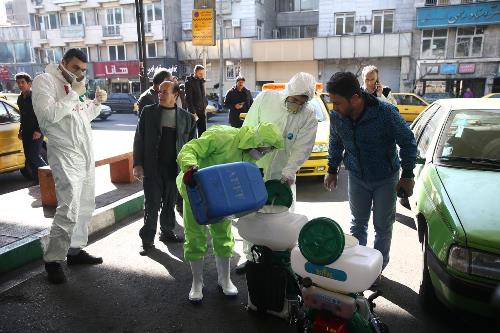Iran’s official leading its response to the new coronavirus acknowledged Sunday the pandemic could overwhelm health facilities in his country, which is battling the worst outbreak in the Mideast while under heavy U.S. sanctions. Iran also reported 113 new deaths from the virus, bringing its death toll to 724.
Muslim authorities, meanwhile, announced that the Al-Aqsa mosque in east Jerusalem, the third holiest site in Islam, would be closed indefinitely due to concerns about the outbreak, with prayers continuing to be held on the sprawling esplanade outside.
Similar measures have been taken at the nearby Western Wall, the holiest place where Jews can pray, where outdoor prayers continue but only 10 people at a time are permitted in enclosed areas, in keeping with measures taken by the Israeli government.
Iran is battling one of the worst outbreaks outside China. The 113 new deaths reported on Sunday by the Health Ministry were the first time a daily reported death toll exceeded 100. The fatalities brought the country’s death toll to 724 so far, amid nearly 14,000 confirmed cases. The real number of infections could be even higher, as questions have been raised about the government’s transparency.
“If the trend continues, there will not be enough capacity,” Ali Reza Zali, who is leading the campaign against the outbreak, was quoted as saying earlier by the state-run IRNA news agency.
Iran is believed to have around 110,000 hospital beds, including 30,000 in the capital, Tehran. Authorities have pledged to set up mobile clinics as needed.
Zali also acknowledged that “many” of those who have died from the COVID-19 illness caused by the virus were otherwise healthy, a rare admission by local authorities that the virus does not only prey on the sick and elderly.
Health Ministry figures show that while 55% of fatalities were in their 60s, some 15% were younger than 40.
For most people, the virus causes only mild or moderate symptoms, such as fever and cough. For some, especially older adults and people with existing health problems, it can cause more severe illness, including pneumonia. Most people recover in a matter of weeks.
The virus has infected more than 150,000 people worldwide and killed more than 5,800. More than 70,000 people worldwide have recovered after being infected.
In Iran, the virus has infected a number of senior officials, including the senior vice president, Cabinet ministers, members of parliament, Revolutionary Guard members and Health Ministry officials.
Authorities have nevertheless been slow to adopt measures taken by other hard-hit countries. Iranian President Hassan Rouhani on Sunday ruled out a general quarantine and said the government was working to keep the borders open.
Dalia Samhouri, a senior regional official with the World Health Organization, said both Iran and Egypt, two of the most populous countries in the Middle East, were likely underreporting cases because of the nature of the virus, which can be spread by individuals who show no visible symptoms. Egypt has reported 110 cases, including two fatalities.
“We can easily say that the current figures are an underestimation of the actual figures,” she said.
Iran has struggled to respond in part because of crippling sanctions imposed by the Trump administration after the U.S. withdrew from the 2015 nuclear deal. The U.S. says it has offered humanitarian aid but that Iran has rejected it.
Countries across the Middle East have imposed sweeping travel restrictions, cancelled public events and in some cases called on non-essential businesses to close for the coming weeks. many have temporarily closed schools and universities.













